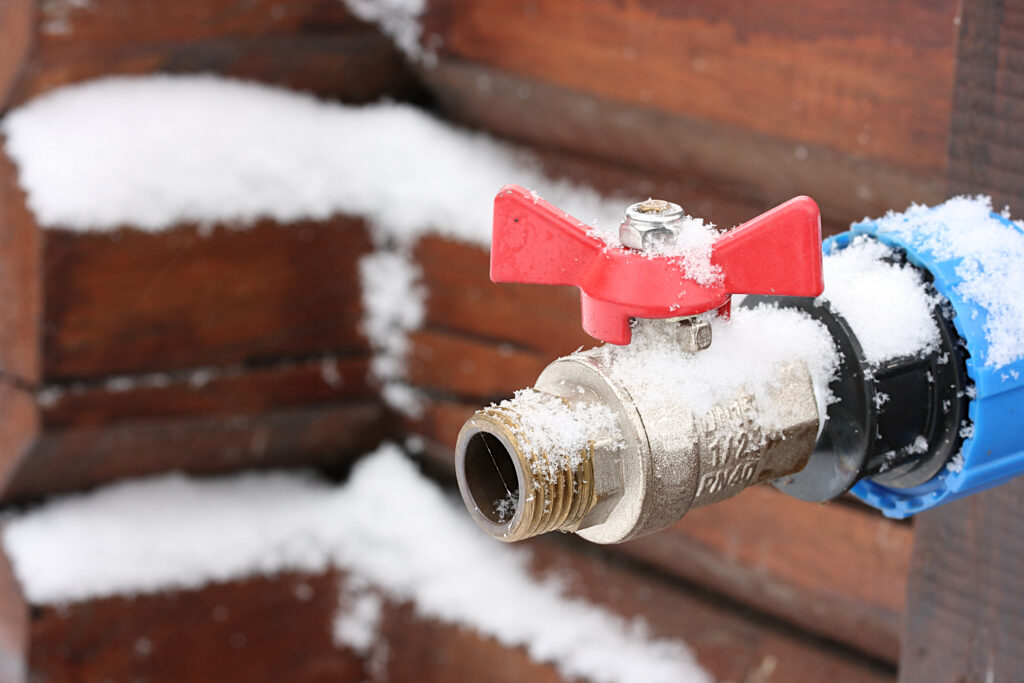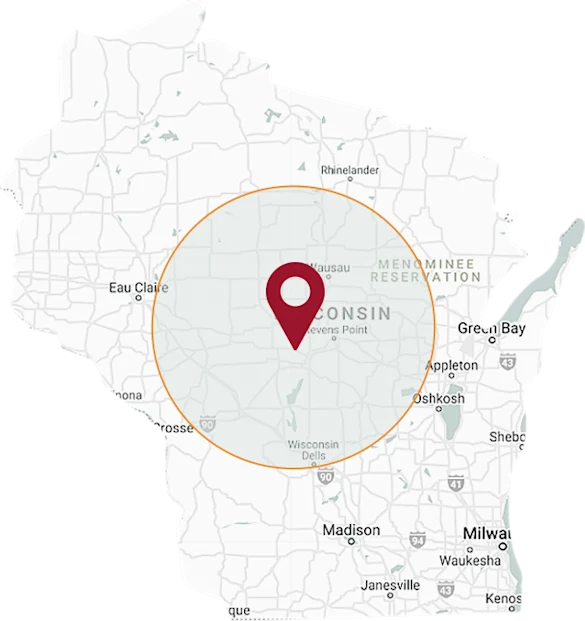As winter’s chill sets in, homeowners face a common adversary: the risk of frozen pipes. When pipes freeze, the consequences can be severe, from disrupted water supply to extensive property damage. Understanding how to prevent frozen pipes, and how to thaw frozen pipes if they do occur, is crucial. Our residential plumbers in Wausau, WI, can guide you on the best ways to protect your home from the cold’s unwelcome effects.
Understanding the Risk
Pipes freeze in cold weather because water expands as it turns to ice. This expansion can cause pipes, particularly those in vulnerable areas like crawl spaces, exterior walls, or basements, to burst. Frozen pipe incidents are most common in areas where the insulation is inadequate or where pipes are exposed to severe cold.
Key Strategies to Prevent Frozen Pipes
1. Insulate Pipes
The first step in preventing frozen water pipes is to insulate them. This is particularly important for pipes located in unheated interior spaces like basements, attics, and garages, as well as in crawl spaces and against exterior walls. Pipe insulation materials include foam rubber or fiberglass sleeves that are easy to install.
2. Seal Air Leaks
Preventing cold air from entering your home is a key step in protecting pipes from freezing. Inspect your home for any leaks, especially near water supply lines, and seal them. Common areas to check include around windows, doors, and where pipes enter the home.
3. Keep a Consistent Temperature
To prevent pipes from freezing, we recommend keeping your home at a consistent temperature during the day and night, especially during a cold snap. If you have to lower the heat at night, make sure it doesn’t go below 55°F, as this could spell disaster for your pipes.
4. Open Cabinet Doors
Allowing warm air to circulate around plumbing can help prevent freezing. During cold spells, keep kitchen and bathroom cabinets open to let warmer air circulate around the plumbing, especially if the sinks are on an exterior wall.
5. Let Faucets Drip
Letting a bit of cold water drip from faucets can prevent pipes from freezing. Even a small trickle can help relieve pressure in the water system, reducing the risk of a burst pipe.
6. Apply Direct Heat
If temperatures are extremely low and you’re worried about a freeze, you can apply heat directly to vulnerable pipes using an electric heating pad or a space heater. However, never use an open flame or flammable materials, as you could damage the piping material and hurt yourself.
What to Do If a Pipe Freezes
If you suspect your home has a frozen pipe, first turn off the water at the main shutoff valve to prevent flooding if the pipe is in danger of bursting. Then, apply heat to the frozen section with a hair dryer, electric heating pad, or towels soaked in hot water. Electric hair dryers are probably the safest and most effective tool for this task.
After you thaw frozen pipes, inspect them carefully for any cracks or damage. Sometimes, frozen pipes can cause subtle damage that may not immediately result in leaks.
If you’re unable to thaw pipes or if there’s significant damage, it’s important to consult a licensed plumber. We can professionally repair the damage and offer advice on how to avoid frozen pipes in the future.
Long-Term Preventative Measures
1. Upgrade Insulation
Enhancing insulation in areas with water pipes, especially near exterior walls and in unheated spaces, can significantly reduce the risk of freezing. This is particularly effective in older homes where insulation may be lacking.
2. Install Pipe Sleeves
Adding pipe sleeves or using heat tape can provide extra protection for exposed pipes. These materials are effective in keeping pipes warm in cold conditions.
3. Monitor the Weather
Being aware of the weather forecast can help you take proactive steps to prevent pipes from freezing. When temperatures drop, you know it’s time to check on the insulation and make sure it’s in good condition..
4. Disconnect Outdoor Hoses
Before winter sets in, disconnect garden hoses and drain outdoor pipes, including swimming pool supply lines and water sprinkler lines. This prevents water from freezing in these lines and potentially affecting the rest of your plumbing system.
5. Keep Garage Doors Closed
For homes with water supply lines in the garage, it’s crucial to keep garage doors closed during cold spells. This helps maintain a warmer temperature in the garage, reducing the risk of freezing.
6. Consider Pipe Rerouting
If you have persistent problems with freezing pipes, consider having a plumber reroute them. This can be especially helpful by keeping pipes from freezing in vulnerable areas like crawl spaces and near exterior walls.
Emergency Tips for Frozen Pipes
In an emergency, you might need to act fast to melt ice within a frozen pipe. An electric heating pad wrapped around the pipe or a hair dryer can provide quick and effective heat. Remember that while it’s important to apply heat to thaw a frozen pipe, safety should be your top priority. Avoid using anything with an open flame, and ensure that heat sources like space heaters are used safely and supervised.
Understanding where your pipes are located and how your home’s plumbing system works is crucial in both preventing and addressing frozen pipes. Knowing the location of the main shutoff valve is especially important in case of a burst pipe.
When to Call a Professional
While many frozen pipe situations can be handled without needing to call in reinforcements, there are times when relying on a licensed plumber is the best course of action. This includes situations where:
- A pipe bursts and causes significant water damage.
- You cannot locate or access the frozen area.
- There are multiple frozen pipes.
- You lack the tools to safely thaw pipes.
Dealing with a Frozen Pipe? Call PGA Inc. for Help!
Preventing and managing frozen pipes is a crucial aspect of winter home maintenance. By taking proactive steps such as insulating pipes, sealing leaks, and applying heat when necessary, you can significantly reduce the risk of damage caused by frozen pipes. Remember, preparation and timely action are key to protecting your home from the cold.
You don’t have to deal with frozen pipes alone. If you’re having trouble accessing the frozen area or need a professional hand to avoid a burst pipe flooding your home, give our team a call! We offer 24/7 emergency plumbing repair services in Wausau, WI, to keep your home and family safe during difficult times!




